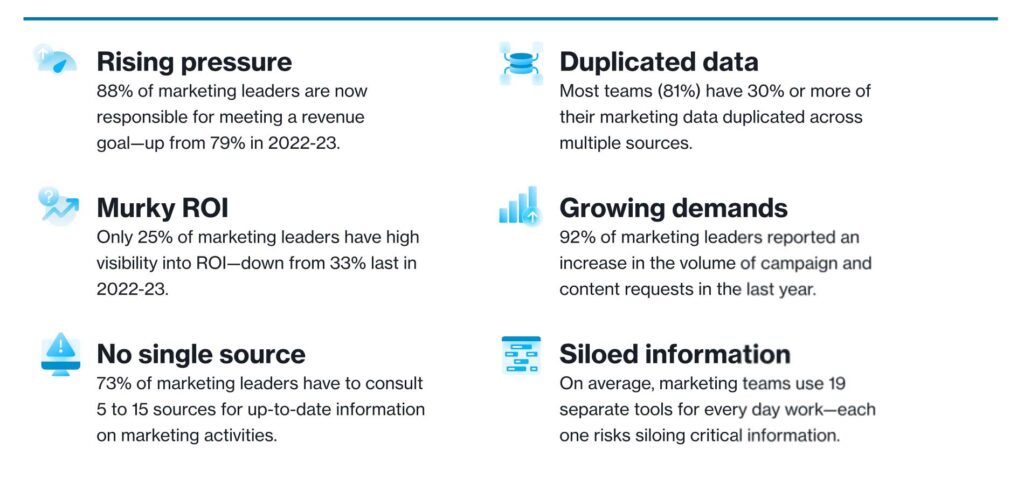What if I told you that 68% of businesses are seeing a higher ROI from content marketing and SEO thanks to AI? Yet, measuring returns remains a critical challenge. Accurate measurement might be the missing piece in your strategy. Airtable released its 2024 Marketing Trends Report detailing a study that includes 550 respondents who are at the director level and above in their marketing department. Turns out, many leaders are facing similar marketing challenges. I’ve never felt so seen by data.

The report provide insights ranging from marketing challenges in data visibility to the role of AI in the tech stack. When I read the statistic about Murky ROI I felt a bond with my fellow marketers. First, I am a startup marketer. Hence, I don’t have a background in enterprise level marketing at a Fortune 500 company. Second, this data proves that problems scale.
During my time as a founder, we were learning on the fly. Fundraising was the first time I had the word data hammered into my head. It was always important, but I didn’t understand it was mission critical. Besides, I was a creative at heart and wanted to make gut decisions.
When you look at the chart, what do you see? If I had to boil it down to one sentence, I’d say the following:
The role of growth marketing has become increasingly important; and although tools are helping teams grow, most teams struggle to find a single source of truth and visibility into what’s driving success.
On first glance, it seems paradoxical. As a startup founder and marketer, I can promise it’s not. Adding tools to a marketing stack doesn’t magically ease marketing challenges. AI helps with scaling productivity, but tools and robots require teams to become more efficient, not less.
It’s hard to decide where you should focus your resources if you don’t understand what activities are valuable. Ultimately, there are many exciting trends as well. For instance, smaller teams can make bigger impacts across content and social media than ever before. Here’s my advice for early startup marketing teams to navigate the challenges of data:
- Start early: Organize important metrics and data points. Understand what’s mission critical and what’s a nice to have. Find out where that data lives. Work with your tech teams on data architecture as early as possible.
- Simplify: In addition, decide if onboarding new tools is necessary or not. It’s not abnormal to use 10+ apps at any stage of growth. However, if resources are available, work with someone technical to build a dashboard. For example, you can leverage APIs to send/receive data from most marketing tools.
- Keep learning: Data attribution is vital. Unfortunately, traditional tracking like third-party cookies are all but dead. Pay attention to how other marketers are solving these issues so you can adapt quickly.
- Automate: I’m a big proponent of automation. However, I recommend learning the why and how before you turn to automation. In fact, you’ll boost your skillset, troubleshoot faster and be able to teach others.
- Zero and first-party data: Lastly, first-party data is customer data you own. Therefore, you should invest heavily in capturing it. The easiest places to start are with email, website, apps and purchase history. Additionally, don’t be afraid to conduct surveys, interactive quizzes, and customer research.

